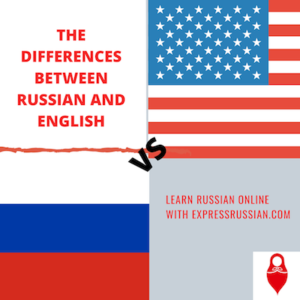In this article:
What are the main differences between Russian and English languages?
Learning Russian may seem like a daunting task. But is Russian so difficult? Not really! It’s just different, it requires a switch in your mindset.
Some areas are even easier than English. However, an unfamiliarity with Russian culture makes many foreigners believe that Russian is an unassailable fortress. Let’s look at the main differences between Russian and English.
Get yourself unstuck and dive into learning the Russian language without fear! We are absolutely sure that everyone can ace at least a beginner’s level of Russian.
Now, let’s compare the 2 languages and see the main differences between Russian and English languages.

Conjugation
While English grammar has minimal inflection, Russian grammar is based on inflections that depend on cases and genders.
The core of Russian grammar is the case system.
The 6 cases – Nominative, Genitive, Dative, Accusative, Instrumental, and Prepositional – show the relationship between the objects and sometimes substitute the propositions.
Read the complete guide on Russian cases and conjugations here.
Genders
One of the main differences between Russian and English is the usage of genders in Russian. Like English, Russian uses a gender system.
Watch this FREE video lesson on Genders in the Russian Language.
In Russian, a noun can belong to one of three genders – masculine, feminine or neutral.
Personal pronouns and adjectives agree with nouns in gender, case, and number (singular or plural). This means that there are different endings for adjectives and personal pronouns depending on the number, case, and gender of the noun they are attached to.
Verbs and Tenses
While English has several different ways of conjugating verbs to show different tenses and states. In Russian, verbs primarily indicate if something is done or not. This is one of the major differences between Russian and English.
Russian verbal system is based on the concept of aspect: actions are either completed or not completed. This is shown by appending affixes to the verb stem.
There are only a few auxiliary verbs. English verbal system, on the contrary, has progressive and perfect tense forms, and uses auxiliaries to form them.
In English: How do you do it?
In Russian: Как вы это делаете? (literally, How you do it?)
Russian uses Present (Simple) for phrases that would use Present Continuous
and Past (Simple) Tense whereas you would use Present Perfect in English.
Have you done it? – Вы это сделали?
Related: Russian Past Tense
Also, the Russian language relies on prefixes to modify the meaning of verbs, the same work is done in English by adverbs.
Take, for example, the sentences below:
He moved away. – Он уехал.
Find our comprehensive guide on Russian prefixes in verbs of motion here.
Sentence
In Russian, sentences have less of a strict structure. In general, a sentence starts with a pronoun/subject which is followed by a verb, and the rest follows.
Words can be placed at different parts in a sentence to emphasize certain aspects, while the most important word stands at the beginning. In English, the word order is rather fixed.
Negation
Russian tends to use a lot of constructions with double negation; the method of expressing the thought “from the reverse” is frequent.
While in English, affirmative sentences prevail, negative structures are rare, and double negation is extremely rare.
Compare: John ate nothing – Джон ничего не съел.
Watch this explanatory video
Expressing negation in a phrase is also one of the main differences between Russian and English languages.
Related: Negative form of sentences in Russian
Spelling
Unlike English, which is filled with homonyms and irregular spelling rules, Russian spelling is very intuitive.
Once you know the alphabet and the sounds that each letter makes, you’ll always be able to spell the word just by speaking it out.
Related: Russian Alphabet – Discover How to Read Russian Letters
Pronunciation
Russian vowels and consonants may sound different depending on their position in a word and the surrounding letters.
Learn more about Russian reading and pronunciation rules from this video.
You may have noticed that Russian rhythms are different from other languages. Often, the melody of Russian sentences sounds strange to foreigners. The general tune may seem monotonous, without ups and downs.
Also, a lot of Russians end questions with a falling intonation instead of a rising one which can sound impolite to English speakers. Just bear this in mind and don’t be surprised, no one means to be rude.
Wanna practice Russian pronunciation? Find plenty of original Russian language movies, cartoons, documentaries, and travel shows on our YouTube Channel.
Also, check our comprehensive list of Russian audios and books to help you study at your own pace. Try to repeat and remember the words and phrases.
Articles
And finally, Russian has no articles – the entire concept does not exist in the Russian language.
Related: How To Learn Russian – 10 Language Learning Tips
Dear Russian learners, we hope you liked our article on the differences between Russian and English languages.
This article is an extract of the book “Russian Grammar and Phrasebook: Beginners’ Russian” created especially for those who need to bring themselves up to speed with Russian language basics.
Our e-book “Basic Russian Vocabulary: 1000 Russian words” will be also handy for beginners and intermediate learners.
Related: Russian For Beginners – On-demand Video Course
What has been your experience so far?
What areas of Russian grammar you find the most challenging? How does Russian compare to your native language?
Write in the comments below, and let’s discuss!


One reply on “Main differences between Russian and English – Your Russian language guide”
Fantastic piece! It’s incredibly beneficial for someone like me who’s learning Russian!